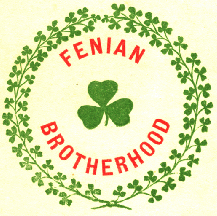
The Fenian Brotherhood was an Irish republican organisation founded in the United States in 1858 by John O'Mahony and Michael Doheny. It was a precursor to Clan na Gael, a sister organisation to the Irish Republican Brotherhood (IRB). Members were commonly known as "Fenians". O'Mahony, who was a Gaelic scholar, named his organisation after the Fianna, the legendary band of Irish warriors led by Fionn mac Cumhaill.

The Irish Republican Brotherhood was a secret oath-bound fraternal organisation dedicated to the establishment of an "independent democratic republic" in Ireland between 1858 and 1924. Its counterpart in the United States of America was initially the Fenian Brotherhood, but from the 1870s it was Clan na Gael. The members of both wings of the movement are often referred to as "Fenians". The IRB played an important role in the history of Ireland, as the chief advocate of republicanism during the campaign for Ireland's independence from the United Kingdom, successor to movements such as the United Irishmen of the 1790s and the Young Irelanders of the 1840s.
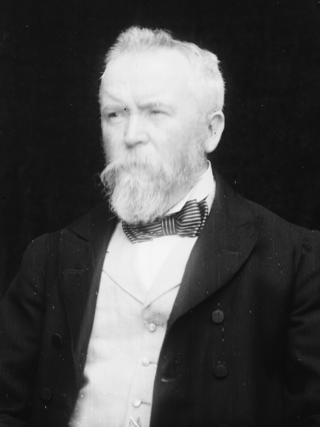
Jeremiah O'Donovan Rossa was an Irish Fenian leader and member of the Irish Republican Brotherhood.

William Randall Roberts was a Fenian Brotherhood member, United States Representative from New York (1871–1875), and a United States Ambassador to Chile. Roberts, an Irish immigrant who became a wealthy businessman, rose quickly to a position of major influence amongst the Fenian Brotherhood before eventually taking leadership. Under his direction, the Fenians in America moved to use Irish-American veterans of the American Civil War to invade Canada in the hopes that they could leverage this against the British Empire to negotiate for an Independent Irish Republic. After the first attempt to invade Canada was not successful, Roberts resigned from the leadership of the Fenians and began to transition into American politics. He served as a United States Representative from New York and Ambassador to Chile until a stroke ended his career.

James Stephens was an Irish Republican, and the founding member of an originally unnamed revolutionary organisation in Dublin. This organisation, founded on 17 March 1858, was later to become known as the Irish Republican Brotherhood (I.R.B).

John O'Leary was an Irish separatist and a leading Fenian. He studied both law and medicine but did not take a degree and for his involvement in the Irish Republican Brotherhood he was imprisoned in England during the nineteenth century.

The Young Irelander Rebellion was a failed Irish nationalist uprising led by the Young Ireland movement, part of the wider Revolutions of 1848 that affected most of Europe. It took place on 29 July 1848 at Farranrory, a small settlement about 4.3 km north-northeast of the village of Ballingarry, South Tipperary. After being chased by a force of Young Irelanders and their supporters, an Irish Constabulary unit took refuge in a house and held those inside as hostages. A several-hour gunfight followed, but the rebels fled after a large group of police reinforcements arrived.

Brian Dillon was an Irish republican leader and a member of the Irish Republican Brotherhood. He was a central figure in the Cork Fenian movement. After being arrested in 1865 for felony treason, he was found guilty and sentenced to ten years' penal servitude. Because of poor health condition, he was given amnesty after four and a half years. He returned to Cork and was welcomed enthusiastically but died eighteen months later.
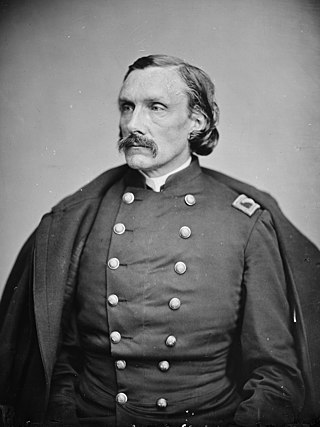
John Francis O'Mahony was an Irish scholar and the founding member of the Fenian Brotherhood in the United States, sister organisation to the Irish Republican Brotherhood. Despite coming from a reasonably wealthy family and being well educated, the primary pursuit of O'Mahoney's life was that of Irish Independence from the United Kingdom, a calling that ultimately left him in poverty. O'Mahony fought in the Young Irelander Rebellion of 1848 as well as the US Civil War, and was involved organisationally in the Fenian Rising of 1867 in Ireland and the Fenian Raids on Canada.

The Cuba Five were a group of Irish rebels released from British prisons in 1871 on condition of not entering Britain until the expiration of their original sentences. They chose to accept exile in the United States, travelling on board the ship SS Cuba from Liverpool docks. The five men were John Devoy, Jeremiah O'Donovan Rossa, Charles Underwood O'Connell, Henry Mullady and John McClure. On arrival in New York they received a rapturous welcome and attempted to reunite the badly split Fenian Brotherhood. In this they failed, but Devoy and O'Donovan Rossa were to go on to become probably the most outstanding members of the Fenian movement in the US in the late nineteenth and early twentieth centuries.
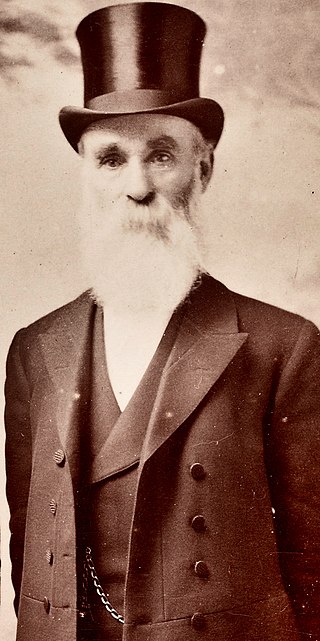
James Francis XavierO'Brien was an Irish nationalist Fenian revolutionary in the 1860s. He was later elected to the House of Commons of the United Kingdom of Great Britain and Ireland, as a Member of Parliament (MP) in the Irish Parliamentary Party.

Thomas Clarke Luby was an Irish revolutionary, author, journalist and one of the founding members of the Irish Republican Brotherhood.

The word Fenian served as an umbrella term for the Irish Republican Brotherhood (IRB) and their affiliate in the United States, the Fenian Brotherhood. They were secret political organisations in the late 19th and early 20th centuries dedicated to the establishment of an independent Irish Republic. In 1867 they sought to coordinate raids into Canada from the United States with a rising in Ireland. In the 1916 Easter Rising and the 1919–1921 Irish War of Independence, the IRB led the republican struggle.
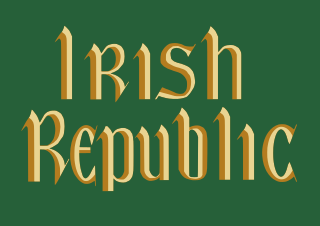
The Phoenix National and Literary Society was an 1856–1859 Irish nationalist organisation based in West Cork. It was established in Skibbereen in December 1856 by Jeremiah O'Donovan Rossa, as a revival of the Young Ireland movement suppressed after its 1848 rebellion. Its aim was to encourage intellectuals to become nationalists and vice versa as well as to encourage a Gaelic revival. It was suppressed as seditious in 1859.

The Fenian Rising of 1867 was a rebellion against British rule in Ireland, organised by the Irish Republican Brotherhood (IRB).
Cornelius O'Mahony was a Gaelic scholar, teacher, Fenian and staunch supporter of Irish independence. He was tried and convicted of conspiracy and sentenced to prison, only to be later transported to Australia.
James Mountaine (c1819-1868) was an Irish Nationalist, "Young Irelander" and Fenian who lived in Cork, Ireland. For the first twenty years of his life, he spelled his name James Mountain. He was a supporter of Daniel O’Connell and the Irish liberation movement. As an adult he resided at 72 North Main Street, Cork, which has since been demolished, and worked as a shoe-maker. He was involved in the Fenian movement and imprisoned multiple times. By the time of his death, James Mountaine was a well known nationalist.
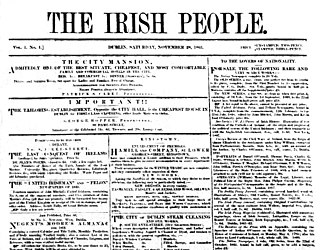
The Irish People was a nationalist weekly newspaper first printed in Dublin in 1863 and supportive of the Fenian movement. It was suppressed by the British Government in 1865.

Henry (Harry) Mullady was a Fenian activist. He was part of The Cuba Five who were exiled from the U.K. in 1871.

Ricard O'Sullivan Burke was an Irish nationalist, Fenian activist, Union American Civil War soldier, U.S. Republican Party campaigner, and a public-works engineer. Travelling extensively, he performed various jobs. He was involved in two prison escape attempts, in Manchester, where a policeman was shot dead, and in London, where twelve passers-by were blown up.

















